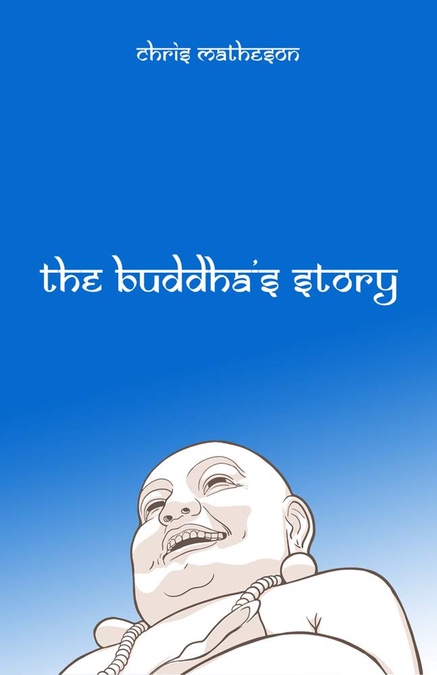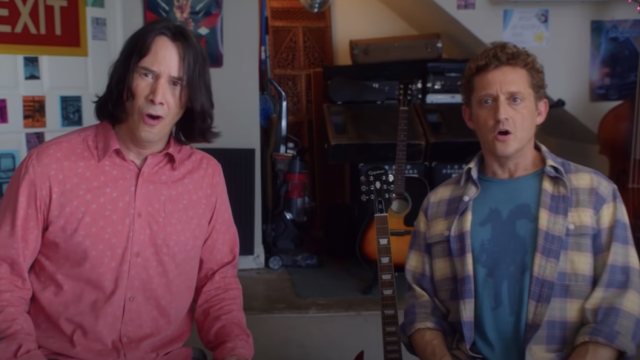It’s been a crappy year, to put it mildly, but one bright beacon has been the promise of Bill & Ted Face the Music, the third adventure featuring the time-travelling dudes played by Keanu Reeves and Alex Winter. Like the other two Bill & Ted films, it’s co-written by Chris Matheson and Ed Solomon, and Gizmodo recently got a chance to speak with Matheson about bringing the duo back.
“It’s a really tough moment in the world, for a variety of reasons. There’s a lot of people who are upset and my hope, our hope, is that Bill and Ted will feel good to people,” Matheson (who also co-wrote A Goofy Movie) told Gizmodo. “Bill & Ted is, to some degree, about being kind to each other and helping each other, and at the risk of sounding really corny, it’s about love.”
As it happens, Matheson is also an author of several irreverent books on religion — an interest that was actually sparked by his experiences filming the first Bill & Ted movie — including a brand-new one titled The Buddha’s Story. With so many projects about to drop, it seemed like just the moment to talk to Matheson about why the Buddha is ripe for comedic skewering — as well as, of course, Bill and Ted’s long journey back to the big screen. What follows is an edited and condensed version of Gizmodo’s interview.
Cheryl Eddy, Gizmodo: Your books have a pretty specific niche — humorous, first-person takes on religious themes. What was the initial inspiration for writing from God’s POV for The Story of God and The Trouble With God, and what made you want to shift to Buddha next?
Chris Matheson: I wasn’t really raised religious. I didn’t have any big bone to pick. I wasn’t, like, harmed by it as a kid or anything. I had really no exposure to it at all. It was actually — part of the filming of Bill & Ted’s Excellent Adventure took place in Italy, and there’s a lot of, you know, beautiful Catholic Churches there. I literally hadn’t set foot in church until that point, until I walked into this church, I think it was in Naples and I just thought, “Holy shit! This is so interesting! This is just unbelievably weird and complex and dense with meaning!” So I got very interested at that point and I started reading the stuff, and I don’t think it really made that much sense to me because I didn’t have much of a grounding in it.
Then I revisited the Bible specifically when I was in my 40s, and it just struck me: this is hilarious! This guy, this God character, is the most insane, ludicrous madman anyone’s ever written! If you just kind of take the book at face value, like “every word in it is true,” then the character that emerges is, to me, insanely funny, so I enjoyed playing with him for a few years. I ended up following him through the Koran and the Book of Mormon because I thought he was such a funny character. He just keeps popping up, you know?
Then I was done, and I thought, maybe I’m gonna look at the Eastern religions now, because I didn’t know much about them at all — and Buddhism of course has this reputation for being the “cool” one, right? Buddhism’s like, you can be sort of hip, or be an intellectual, and be a Buddhist. I’d met a few American Buddhists that I wasn’t knocked out by. I thought they were kind of smug. So that sort of predisposed me in a certain direction, I guess.

Anyway, I started reading their stuff, and they don’t have one sacred text like the Bible or the Koran or the Book of Mormon. They have a bunch. So I kind of immersed myself for about a year reading all of these stories about the life of the Buddha, and all of the belief systems involved. About halfway through, I thought, “Yeah…this has it coming, too.” They’ve gotten a pass. And it’s not what people think it is. It’s really not. I ended up thinking it was every bit as dumb, and ugly, and mean-spirited as the Western religions. And also really, really fraudulent. Super fraudulent! Because it’s ostensibly about no ego, but it’s all about ego. The whole thing is about this guy’s ego.
Gizmodo: Has anyone ever gotten upset with you, or taken offence, or just not understood your intentions with these books?
Matheson: I’m sure they have. I’m sure they have. I don’t really do social media, so I don’t know. Ah, probably. I’ve read reviews on Amazon that were pretty nasty, like the predictable thing of how I’m going to burn in hell and be punished forever. Books like these are going to be kind of self-selecting, you know, in terms of who’s going to read them. There’s not going to be a lot of Evangelical Christians that are gonna read them. I don’t imagine a lot of Buddhists will read this one. I could be wrong. I’d love to be wrong! But, I think if I was on social media there’s be more [anger directed at me], but I’m not.
Gizmodo: The Bill & Ted movies aren’t overtly religious, of course, but there are certain elements — like the characters travel to Heaven and Hell in the second film. Were those story points a reflection of your own interests?
Matheson: I think it must have been because they could have gone anywhere, right? It’s not the story the studio wanted, that’s for sure! They wanted us to send them on an English literature report, where they’d just kind of do the same thing except in a different class. We didn’t want to do that. That didn’t seem funny or interesting to us. And the idea of them dying and dealing with Heaven and Hell and God and Satan, as they literally do, yeah I think that must have somehow been on my mind. It certainly seemed a bit comedic.
Gizmodo: What was the initial spark that put the third Bill & Ted movie in motion, and why do you think 2020 is the right moment for its release?
Matheson: I think there was very little interest on the part of Alex and Keanu for a long time, and it felt like Ed and I weren’t really even trying to do much of anything. Between when Bogus Journey came out in ‘91, and until 2008, really nothing happened. But I think in 2008 Ed and I must have had a couple of ideas. A couple of notions, anyway. So we got together for dinner with Alex and Keanu and we floated some of these ideas and said, “Would you guys have any interest in pursuing this at all?” And they were kind of open to it.
They liked the starting point: that thing that was supposed to happen, of [Bill and Ted] saving the world, it hasn’t worked out. So here they are, 50 years old, and it hasn’t happened, and what that’s been like for them? How has that landed? What has that done to their inner lives? What has that done to their marriages, their finances, what is that like to live with all that pressure? And I think they found that interesting.
And then we just needed to find sort of the story, the plot, that would drive that. At a certain point, Ed and I bumped into the idea of A Christmas Carol and It’s a Wonderful Life, meaning visiting your own life. As I’m sure you know, presumably you’ve seen the trailer, basically, it’s that they go into the future and keep interacting with different versions of themselves. And they liked that, they thought it was funny, so around 2010 they said, “Yeah, you guys should write that!”
So we wrote it on spec, meaning we didn’t get paid for it. And even beyond that, we didn’t even own it. MGM owned the property, so it was really kind of a foolish thing to do in a way, because we didn’t even own what we were writing and at any point they could have done whatever they wanted. So we put it out in the world in 2011, and it was sort of a resounding thud. Nobody was really interested — which surprised us because we were excited, and we felt like what we had was pretty good. To their credit, MGM said “You can take it other places,” so we did, and no place else wanted to do it either. So we were sort of dead in the water in 2014, somewhere around there. There was just not a lot of interest. Then, I think John Wick probably was the game-changer because it started looking different to people. In 2016, we kind of had a deal with the studio — we almost got there, but it didn’t happen. In 2018, we had a real deal with this studio Hammerstone, in 2019 we made it, and now we’re putting it out.
I hope it is the right moment for it. I think it’s certainly a good moment for it. It’s a really tough moment in the world, for a variety of reasons. There’s a lot of people who are upset and my hope, our hope, is that Bill and Ted will feel good to people. Bill & Ted is, to some degree, about being kind to each other and helping each other, and at the risk of sounding really corny, it’s about love. And hopefully, as the producer Scott Kroopf said, “It’s kind of a feel-good movie at a kind of feel-bad time.”
Gizmodo: I’ve always wondered what approach you guys took to mapping out all the time travel in the movies.
Matheson: Not very rigorously, actually. My dad [Richard Matheson] was a science fiction writer — he wrote a time travel story called Somewhere in Time. So I kind of grew up around these concepts a little bit; maybe I got some of it through osmosis or something. But I don’t really think of myself as being a science fiction writer. Ed might be a bit more so, but I don’t think he thinks of himself as a science fiction writer either. We just kind of tried to follow the characters and tried to specifically go to the things that we thought were funny, and then tried to come up with the simplest, most semi-plausible explanation for that we could.
And, then we just didn’t worry about it very much — all the conundrums of time, there’s so many, it’s bottomless basically. We just didn’t even really think about them. That’s a real rabbit hole that you can get caught in, and I don’t think that’s how either one of us thinks. So we just tried to make it kind of simple, silly, and playful. Playful, I guess, is what we were going for.
Chris Matheson’s The Buddha’s Story is out August 31; Bill & Ted Face the Music is out August 28.
